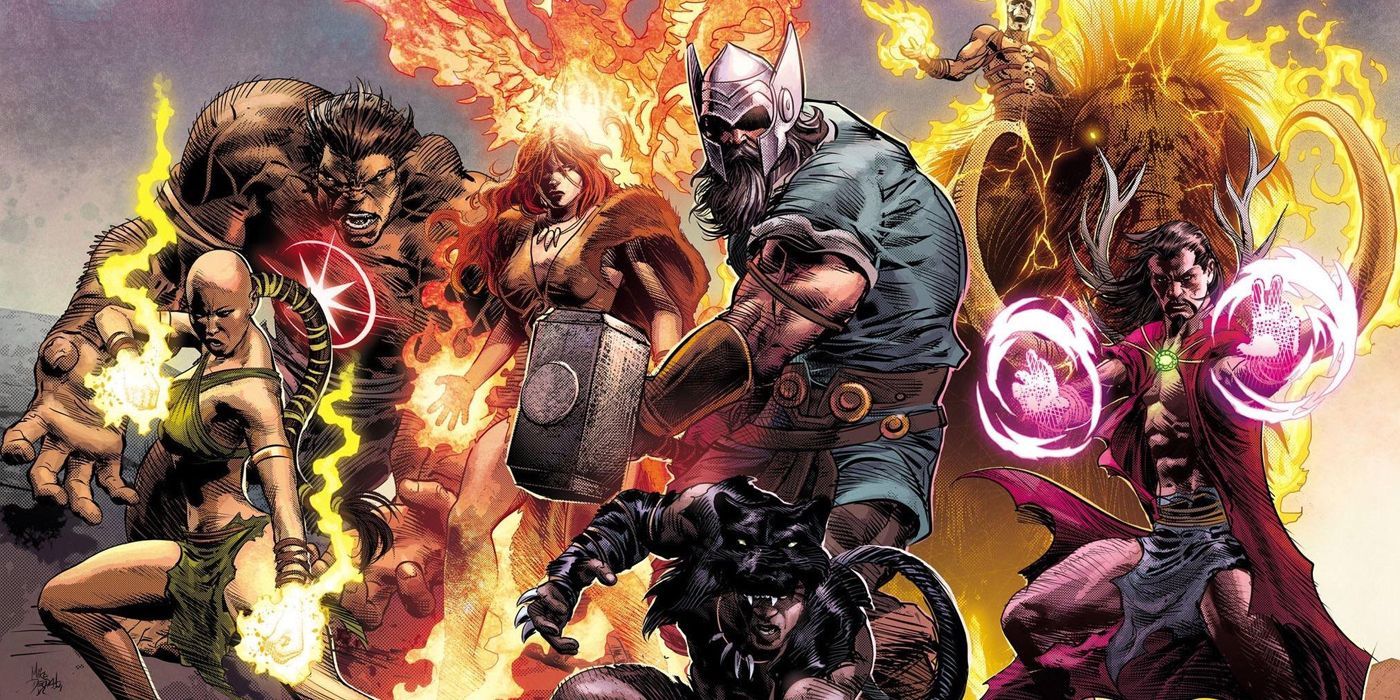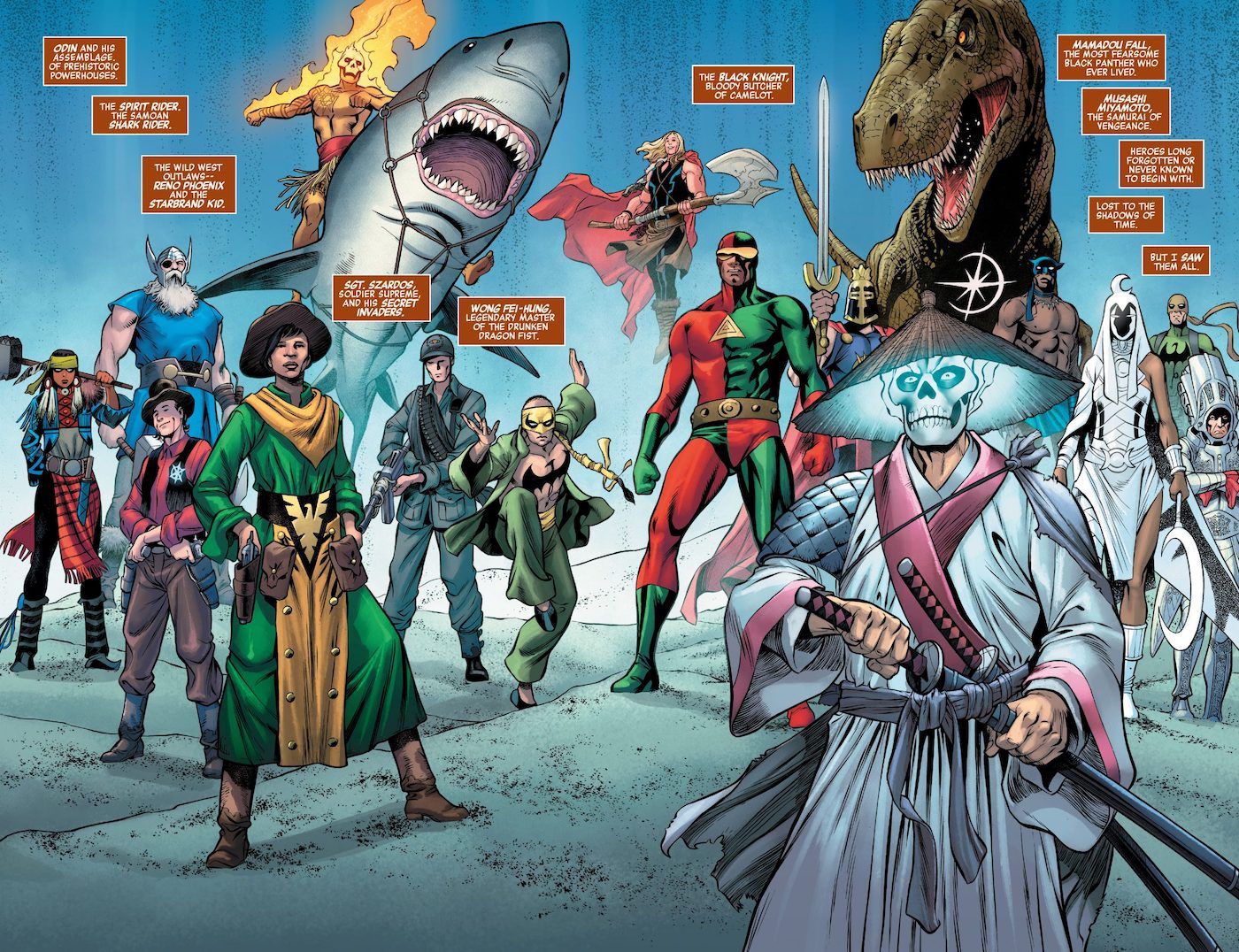Warning! Spoilers for Avengers #50 ahead!
The latest issue of Avengers takes one step closer to confirming the "Godpower" theory that connects all the different manifestations of superpowers in the Marvel Universe. The idea of this theory was first presented during the 2020 X-Men/Fantastic Four crossover by Chip Zdarsky and Terry Dodson, but it has not been developed further. Since Marvel's beginnings, there have been frequent attempts to provide pseudo-scientific explanations for super-powers, or at least give them some in-world coherence. The main obstacle in that path has always been the first law of thermodynamics: energy can be transformed from one form to another, but can be neither created nor destroyed.
In X-Men/Fantastic Four, Reed Richards is pondering this problem while attempting to find an explanation for his son Franklin's dwindling powers. The Godpower Theory, proposed by Dr. Rachna Koul, a scientist specializing in super-powers, seems to him the most believable solution. Dr. Koul theorized that all super-powered beings are connected to one or more interdimensional energy sources, which she dubbed "Godpower." This could explain the otherwise impossible expenditure of energy caused by super-powers. Other Marvel comics seemed to confirm this theory, albeit never referencing it directly. Most notably, the Immortal Hulk series by Al Ewing and Joe Bennet revealed that Bruce Banner's power is connected to a cosmic being called the One Below All (who may or may not be the Devil). The greatest confirmation that Marvel is developing this theory, however, comes from the concept of "legacy powers," as it has been presented during Jason Aaron's current run on Avengers.
The concept of "legacy" has been central in Marvel stories since the 2017-2018 relaunch of the publisher's comic book line (called precisely "Marvel Legacy"), which sought to bring a greater focus to Marvel's core superheroes. Since the first appearance of the Avengers of 1,000,000 B.C. in Marvel Legacy #1, readers have been introduced to the concept that Marvel's most important heroes have always existed on Earth, in one form or another, thus creating a "legacy" that goes back to the earliest days of humankind. In Avengers #50 by Jason Aaron, Aaron Kuder, Carlos Pacheco, Ed McGuinness and Javier Garrón, the Black Panther mentions his theory about "the importance of the Earth's oldest legacy powers," which could be connected to the Godpower Theory.
In the same issue, the devil Mephisto is enticing a version of Dr. Doom called "Doom Supreme" to form a team of villains to "reshape the history" of every Earth. He describes the planet as a breeding ground of "cosmic irritants," super-powered protectors that stand in the way of conquest and destruction. This could lead to an explanation for why the Earth is "infested" with super-beings, a topic that Aaron approached already at the very beginning of his run on Avengers. The Godpower Theory, assuming that every super-power is connected to a source, tries to explain the how, but not the why. Mephisto's and Black Panther's words could hint at an answer to the latter question.
T'Challa goes so far as to send one of his Agents of Wakanda, Ka-Zar, on a special mission through time to collect intelligence on the legacy powers and their importance for Earth. If the planet is, as it has been hinted many times, a battleground of cosmic importance and a nexus of realities, it is possible that, whatever the "Godpowers" are, they have an interest in protecting it, empowering chosen individuals throughout the ages. For every hero, however, there is a villain, so it is sensible to think that not every Godpower has a good agenda and some are actually on the side of conquest and destruction. If this is true, then the Godpower Theory and the legacy heroes are all part of the same picture: one amazing storyline that has been developing since the Marvel Legacy relaunch.


